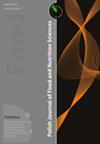电解木薯淀粉凝胶包衣对香蕉果实生化特性和成熟度的影响
IF 2.3
4区 农林科学
Q3 FOOD SCIENCE & TECHNOLOGY
引用次数: 4
摘要
本研究以电解氧化的木薯淀粉为食用涂层,提高香蕉果实的保质期。评估了在室温(75–80%相对湿度)下储存8天期间,在含有1%、2%和3%(w/v)明胶和不添加明胶的电解淀粉溶液中包衣对香蕉呼吸速率和生化特性的影响。扫描电子显微镜的显微照片显示,涂层非常薄(<25.2毫米),具有连续的网络拓扑结构,没有裂纹。在贮藏期间,与未包衣的水果相比,包衣香蕉的呼吸速率和重量损失显著降低。此外,包被香蕉的可滴定酸度和可溶性固形物、总碳水化合物和还原糖含量的变化较慢。增加涂膜中明胶的含量对延缓香蕉成熟有一定的作用。含有3%(w/v)明胶的氧化淀粉包衣制剂表现出最高的效率,因为它比未包衣的香蕉多延迟呼吸峰值4天。本研究结果表明,电解淀粉-明胶涂层可能是一种潜在的延长水果保质期的材料。本文章由计算机程序翻译,如有差异,请以英文原文为准。
Effect of Electrolyzed Cassava Starch-Gelatin Coating on Biochemical Properties and Ripening of Banana (Musa acuminata L.) Fruits
In this study, cassava starch oxidized by the electrolysis was used as an edible coating to improve the shelf life of banana fruits. The effects of coating in solutions of electrolyzed starch with 1, 2 and 3% ( w/v ) gelatin and without gelatin addition on respiratory rate and biochemical properties of banana during 8 days of storage at room temperature (75–80% relative humidity) were evaluated. The micrographs of scanning electron micros - copy showed very thin coating layers (<25.2 mm) with continuous network topology and no cracks. During the storage period, a significant reduction in respiration rate and weight loss of coated bananas compared to uncoated fruits was noted. Furthermore, the change in titratable acidity and contents of soluble solids, total carbohydrates and reducing sugars of coated bananas were slower. Increasing the gelatin content in the coating had a beneficial effect on delaying the ripening of bananas. The oxidized starch coating formulation with 3% ( w/v ) of gelatin demonstrated the highest efficiency as it delayed the respiratory peak 4 days more than in the uncoated bananas. This study results suggest that electrolyzed starch-gelatin coating could be a potential material to extend the shelf life of fruits.
求助全文
通过发布文献求助,成功后即可免费获取论文全文。
去求助
来源期刊

Polish Journal of Food and Nutrition Sciences
FOOD SCIENCE & TECHNOLOGY-
CiteScore
4.30
自引率
12.50%
发文量
25
审稿时长
20 weeks
期刊介绍:
The Polish Journal of Food and Nutrition Sciences publishes original, basic and applied papers, reviews and short communications on fundamental and applied food research in the following Sections:
-Food Technology:
Innovative technology of food development including biotechnological and microbiological aspects
Effects of processing on food composition and nutritional value
-Food Chemistry:
Bioactive constituents of foods
Chemistry relating to major and minor components of food
Analytical methods
-Food Quality and Functionality:
Sensory methodologies
Functional properties of food
Food physics
Quality, storage and safety of food
-Nutritional Research Section:
Nutritional studies relating to major and minor components of food (excluding works related to questionnaire
surveys)
-“News” section:
Announcements of congresses
Miscellanea
 求助内容:
求助内容: 应助结果提醒方式:
应助结果提醒方式:


